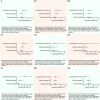Recurrence of breast cancer after reconstruction with macro-textured silicone breast implants: a retrospective cohort study
- PMID: 38920328
- PMCID: PMC11487012
- DOI: 10.1097/JS9.0000000000001878
Recurrence of breast cancer after reconstruction with macro-textured silicone breast implants: a retrospective cohort study
Abstract
Background: Recently, old concerns linking silicone breast implants (SBIs) with breast cancer have resurfaced. These concerns apply specifically to the risk of breast cancer recurrence in patients who received breast reconstructions with macro-textured SBIs. In this study, the authors investigated the effect of breast reconstruction with macro-textured SBIs on long-term oncologic outcomes of breast cancer patients.
Materials and methods: The authors conducted a retrospective cohort study in two large cancer centres in the Netherlands. Patients who had been treated for primary breast cancer between 1 January 2000 and 31 December 2015 were included. Data on treatment and oncologic outcomes were obtained from prospectively maintained institutional and nationwide registries. Patient files were reviewed manually to complement missing information. Missing data were accounted for by multiple imputations by chained equations (MICE). Reconstruction with a macro-textured SBI was analysed as a time-dependent variable. The main outcomes of interest were locoregional recurrence-free survival (LRRFS) and distant metastasis-free survival (DMFS). Hazard ratios (HRs) were estimated using multivariable Cox proportional hazard models.
Results: Of the 4695 women who were eligible for inclusion, 2393 had undergone mastectomy. Of these women, 1187 (25%) had received breast reconstruction with a macro-textured SBI. The mean follow-up time was 11.5 (SD, 5.0) years. Compared with women who had undergone a simple mastectomy or autologous breast reconstruction, women with an implant-based reconstruction did not differ significantly in LRRFS or DMFS after accounting for various confounding factors [HR 1.27 (95% CI 0.93-1.72) and HR 0.94 (95% CI 0.74-1.20), respectively]. Sensitivity analysis in complete cases of patients and various subgroup analyses yielded similar results.
Conclusion: Reassuringly, in this multi-centre cohort study no difference was found in long-term oncologic outcomes between women who had received breast reconstruction with a macro-textured SBI and women who had undergone a simple mastectomy or autologous breast reconstruction.
Copyright © 2024 The Author(s). Published by Wolters Kluwer Health, Inc.
Conflict of interest statement
The authors confirm that there are no financial or non-financial competing interests to report.
Figures


References
-
- Morgenstern L, Gleischman SH, Michel SL, et al. . Relation of free silicone to human breast carcinoma. Arch Surg 1985;120:573–577. - PubMed
-
- De Cholnoky T. Augmentation mammaplasty. Survey of complications in 10,941 patients by 265 surgeons. Plast Reconstr Surg 1970;45:573–577. - PubMed
-
- Deapen DM, Pike MC, Casagrande JT, et al. . The relationship between breast cancer and augmentation mammaplasty: an epidemiologic study. Plast Reconstr Surg 1986;77:361–368. - PubMed
-
- Institute of Medicine Committee on the Safety of Silicone Breast I . The National Academies Collection: Reports funded by National Institutes of Health Bondurant S, Ernster V, Herdman R editors. Safety of Silicone Breast Implants. National Academies Press (US). Copyright © 2000, National Academy of Sciences 1999.
-
- Kouwenberg CAE, de Ligt KM, Kranenburg LW, et al. . Long-term health-related quality of life after four common surgical treatment options for breast cancer and the effect of complications: a retrospective patient-reported survey among 1871 patients. Plast Reconstr Surg 2020;146:1–13. - PubMed
MeSH terms
Substances
LinkOut - more resources
Full Text Sources
Medical

